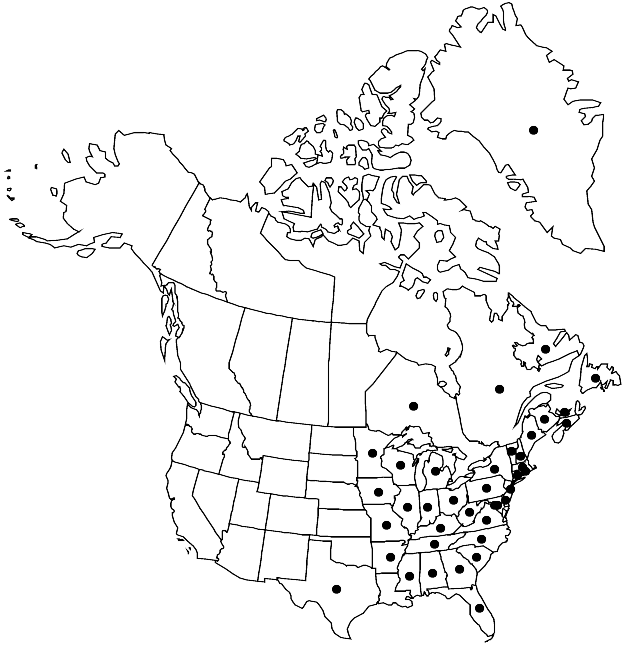Difference between revisions of "Hypnum imponens"
Sp. Musc. Frond., 290, plate 77, figs. 1–5. 1801.
FNA>Volume Importer |
FNA>Volume Importer |
(No difference)
| |
Revision as of 22:05, 16 December 2019
Plants medium-sized to large, golden to yellow-green or brownish. Stems 3–10 cm, reddish brown, creeping, regularly pinnate, occasionally partly 2-pinnate or irregularly branched, branches 0.3–1.2 cm; hyalodermis absent, central strand weak; pseudoparaphyllia lanceolate or foliose, margins usually incised. Stem leaves falcate-secund, triangular-ovate to oblong-lanceolate, gradually narrowed to apex, 1.8–2 × 0.6–0.8 mm; base somewhat decurrent, not auriculate; margins plane or weakly recurved basally, serrulate distally or rarely nearly entire; acumen slender; costa double, short, or indistinct; alar cells subquadrate, basalmost cells deep orange-brown, outer cells hyaline, region weakly defined, not to weakly excavate, 5–10 cells high on margin; basal laminal cells broader than medial cells, yellow-orange to orange-brown, walls pitted; medial cells 50–70(–80) × 3–4(–5) µm, walls sometimes porose, not pitted. Sexual condition dioicous; inner perichaetial leaves oblong-lanceolate, margins serrate in apex, apex long, costa indistinct. Seta red-brown, 1–3 cm. Capsule erect to slightly inclined, red-brown, cylindric, 1.5–3 mm; annulus scarcely differentiated; operculum conic to rostellate; endostome cilia 1, sometimes 2 or rudimentary.
Phenology: Capsules mature Jul–Sep.
Habitat: Decaying logs, rock, soil
Elevation: low to high elevations (0-2000 m)
Distribution

Greenland, N.B., Nfld. and Labr., N.S., Ont., P.E.I., Que., Ala., Ark., Conn., Del., D.C., Fla., Ga., Ill., Ind., Iowa, Ky., Maine, Md., Mass., Mich., Minn., Miss., Mo., N.H., N.J., N.Y., N.C., Ohio, Pa., R.I., S.C., Tenn., Tex., Vt., Va., W.Va., Wis., Europe.
Discussion
Hypnum imponens is an amphi-Atlantic species that produces sporophytes, sometimes abundantly, in summer. The species is distinguished by the often pigmented, heterogeneous alar cells, usually reddish stems, long-toothed, foliose, usually numerous pseudoparaphyllia, and nearly erect, cylindric capsules. The branches usually emerge in one horizontal plane; the leaves are not to weakly plicate; the perichaetial leaf margins are often strongly revolute proximally; and the capsules are somewhat curved below the mouth. The lanceolate or filamentous pseudoparaphyllia and generally homogeneous alar cells of H. cupressiforme and its near relatives are usually sufficient to separate them from this species.
Selected References
None.